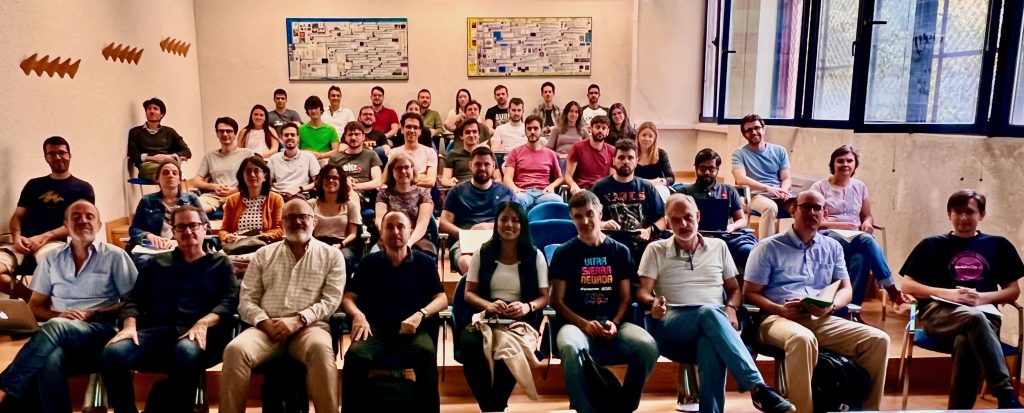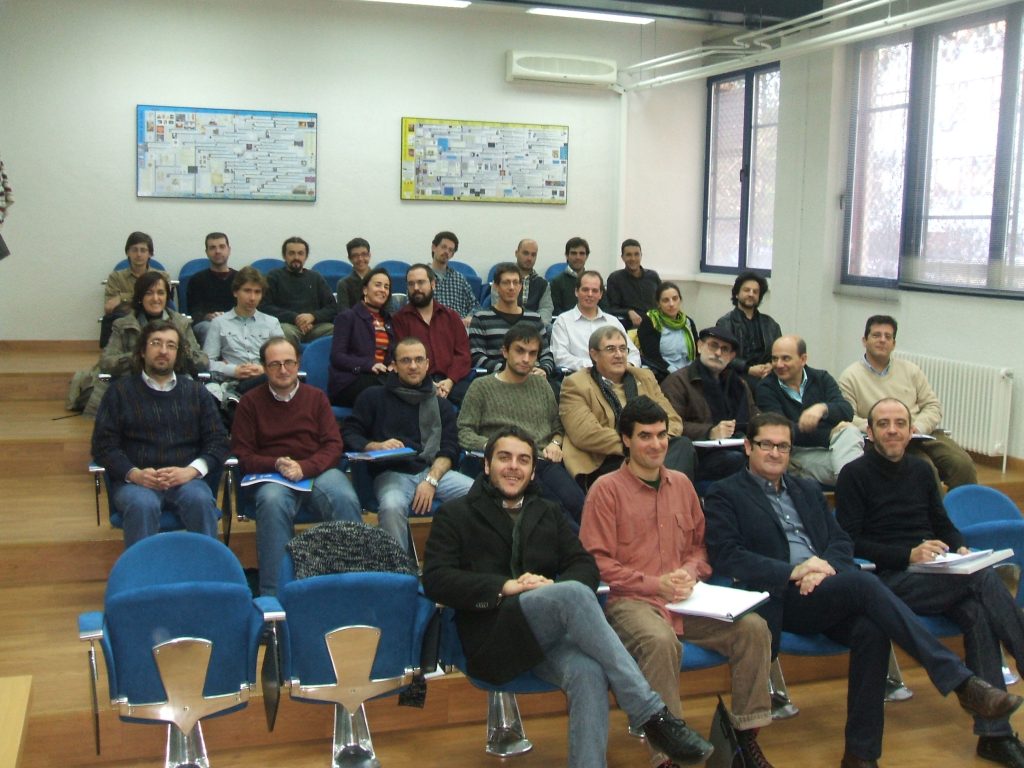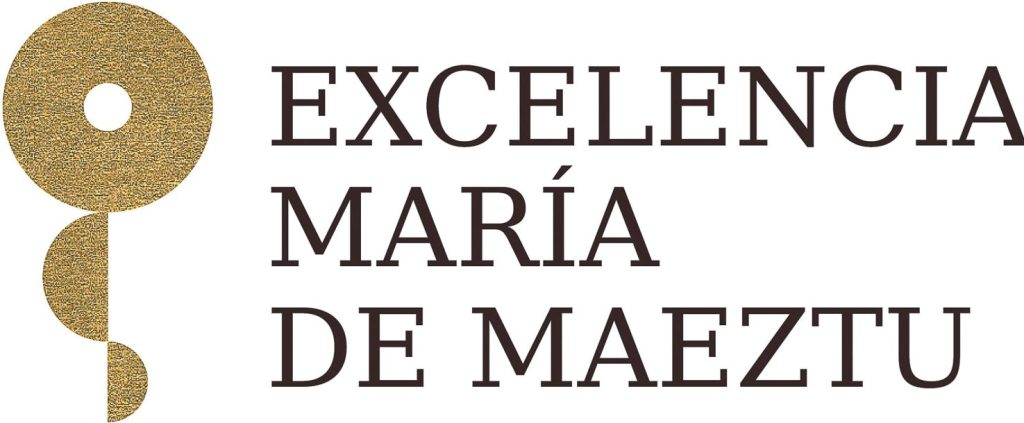Young Researcher’s Workshop on Nonlocal PDEs and Applications
The Young Researcher’s Workshop on Nonlocal PDEs and Applications will take place at the University of Granada from October 26 to 28, 2022. This event is part of the Red de EDPs No Locales y Aplicaciones, funded by MICINN with reference RED2018-102650-T.
This event is organised by José Cañizo <canizo@ugr.es> and Juan Soler <jsoler@ugr.es> (Universidad de Granada).
Speakers
- Miguel Ángel Alejo (Universidad de Córdoba)
- Albert Clop (Universitat de Barcelona)
- Carlota Cuesta (Universidad del País Vasco)
- Gisell Estrada (University of Oxford)
- Claudia García (Universidad Autónoma de Madrid)
- David Gómez Castro (Universidad Complutense de Madrid)
- Mar González (Universidad Autónoma de Madrid)
- Rafael López Soriano (Universidad de Granada)
- Martina Magliocca (Université d’Evry)
- Francisco Mengual (Universidad de Sevilla)
- David Poyato (Universidad de Granada)
- Tomás Sanz Perela (Universidad Autónoma de Madrid)
- Diana Stan (Universidad de Cantabria)
- Julián Toledo (Universitat de València)
- Francisco Torres de Lizaur (Universidad de Sevilla)
Conference photo
We include the workshop photo, and another one from a 2008 workshop which was shown during the workshop presentation:


Funding
The workshop is organised and mainly funded by Red de EDPs No Locales y Aplicaciones (RED2018-102650). Additional contributions from research grant PID2020.117846GB.I00 from Ministerio de Ciencia e Innovación / AEI and the sources listed here.





Program:
Please find here the workshop schedule. The list of titles and abstracts can be found below in this same page.
Schedule
Wednesday 26
11:15-12:00 Julián Toledo
12:00-12:45 Gissell Estrada
15:30-16:15 Tomás Sanz-Perela
16:15-16:45 Coffee
16:45-17:30 Claudia García
17:30-18:15 Miguel Ángel Alejo
Thursday 27
10:00-10:45 Martina Magliocca
10:45-11:15 Coffee
11:15-12:00 Carlota Cuesta
12:00-12:45 David Gómez-Castro
15:30-16:15 Francisco Torres de Lizaur
16:15-16:45 Coffee
16:45-17:30 Mar González
17:30-18:15 Albert Clop
Friday 28
10:00-10:45 Diana Stan
10:45-11:15 Coffee
11:15-12:00 David Poyato
12:00-12:45 Rafael López Soriano
12:45-13:30 Francisco Mengual
Titles and abstracts
Miguel Ángel Alejo (Universidad de Córdoba)
Breather Solutions in the Modified Whitham Equation
We are concerned on numerical approximations of breather solutions for a water wave model, called modified Whitham equation(mW), and which it is a non-integrable model. Also as a non local model, it generalizes, in the low frequency case, the well known modified KdV (mKdV) equation which is an integrable model. The mKdV equation has breather solutions, i.e. periodic in time and localized in space biparametric solutions. In this talk, we show numerical evidences, that even in the non integrable case of the modified Whitham equation, these breather solutions also exist.
Albert Clop (Universitat Autònoma de Barcelona)
Nonlinear transport equations and quasiconformal maps
We will prove existence of bounded solutions of an active scalar equation whose drift has unbounded divergence. The proof combines classical ideas from Fluid Mechanics with other ones arising from Geometric Function Theory. During the talk, we will be overview some related recent advances on DiPerna - Lions theory with unbounded divergence, and explain their connection to our nonlinear result. This is a joint work with Banhirup Sengupta.
Carlota Cuesta (Universidad del País Vasco)
Non-classical shocks in a non-local generalised Korteweg-de Vries-Burgers equation
We study travelling wave solutions of a generalised Korteweg-de Vries-Burgers equation with a non-local diffusion term and a concave-convex flux. This model equation arises in the analysis of a shallow water flow by performing formal asymptotic expansions associated to the triple-deck regularisation (which is an extension of classical boundary layer theory). The resulting non-local operator is a fractional type derivative with order between 1 and 2. Travelling wave solutions are typically analysed in relation to shock formation in the full shallow water problem. We show rigorously the existence of travelling waves that, formally, in the limit of vanishing diffusion and dispersion would give rise to non-classical shocks, that is, shocks that violate the entropy condition. The proof is based on arguments that are typical in dynamical systems. The nature of the non-local operator makes this possible, since the resulting travelling wave equation can be seen as a delayed integro-differential equation. Thus, linearisation around "critical points", continuity with respect to parameters and a shooting argument, are the main steps that we have proved and adapted for solving this problem.
Gissell Estrada-Rodriguez (University of Oxford)
From kinetic descriptions to nonlocal PDEs in R^n and in networks
The movement of certain individual particles have been shown to be governed by long distance runs, according to an approximate Levy distribution. In this talk we clarify the form of corresponding PDE descriptions for such movements. From the kinetic equations obtained from the microscopic movement we derived nonlocal Patlak-Keller-Segel equations and fractional diffusion equations in the appropriate limit.
Furthermore, this nonlocal movement of individuals has been observed in more complex geometries, e.g., the brain. We propose to study the (nonlocal) diffusion using a network of subdomains, corresponding to the nodes of a graph. I will introduce metaplex networks which are networks with internal structure, and we will extend our analysis to two real world examples: a brain and a landscape network
Claudia García (Universidad Autónoma de Madrid)
Self-similar spirals for the generalized surface quasi-geostrophic equations
In this talk, we will construct a large class of non-trivial (non radial) self-similar solutions of the generalized surface quasi-geostrophic equation. To the best of our knowledge, this is the first rigorous construction of any self-similar solution for these equations. Moreover, the solutions are of spiral type, locally integrable and may have a change of sign. This is a joint work with Javier Gómez-Serrano.
David Gómez Castro (Universidad Complutense de Madrid)
Boundary singularity for fractional elliptic and parabolic problems
In this talk we present results on the equations $(-\Delta)^s u = f$ and $u_t + (-\Delta)^s u = f$ in a bounded domain with homogeneous boundary (resp. exterior) condition for the common choices of fractional laplacian (Restricted, Spectral and Censored) and some more general operators of fractional type.
We begin by presenting known results for smooth data $f$ and the most general results known for the usual Laplacian $(-\Delta)$. Then, we extend these results to detect the optimal integrability conditions on the data $f$. We show that $u$ can diverge towards the boundary uniformly, a feature not present in for the usual Laplacian. We also show the existence of a singular boundary data problem as a limit of the previous interior theory.
Our technique is based on the sharp analysis of the Green function. We provide numerical simulations supporting our results in the relevant examples of Restricted, Spectral and Censored fractional Laplacian.
This is joint work with N. Abatangelo, H. Chan, and J.L. Vázquez.
Mar González (Universidad Autónoma de Madrid)
Eigenfunctions for a Levy Fokker-Planck equation
When one writes the fractional heat equation in self-similar variables a drift term appears. We study the associated eigenvalue problem for this new equation, which has a fractional Laplacian and a first order term under competition. Our main contribution is to show that there is a discrete sequence of eigenvalues, and to give explicit Euclidean formulae of the fractional analogue of Hermite polynomials. We also show that the gain of regularity of the solution in Sobolev spaces is given by the diffusion term, independently of the drift. A crucial tool is the Mellin transform, which is essentially the Fourier transform in logarithmic variables and which turns the gradient into multiplication. The proof is inspired in the calculation of the conformal fractional Laplacian on the cylinder. This is joint work with Hardy Chan, Marco Fontelos and Juncheng Wei.
Rafael López Soriano (Universidad de Granada)
Prescribing geodesic and Gaussian curvatures in surfaces with boundary
This talk is concerned with a Liouville type equation on compact surfaces with boundary. More precisely, this problem allows us to assign Gauss and geodesic curvatures under a conformal change of the metric. The 2-disk case represents the most delicate situation due to non-compact invariance. We will focus on analyzing the blow-up phenomenon, deriving a necessary non-local condition. Joint work with A. Jevnikar, M. Medina and D. Ruiz.
Martina Magliocca (Université d'Évry)
On a cell motility model: recent results and open problems
In this talk, we will study the existence of traveling waves using bifurcation methods (Crandall-Rabinowitz argument and the Leray-Schauder degree theory) for an incompressible Darcy free boundary problem that describes cell motility. Finally, we will also introduce some open problems.
This is a joint work with Thomas Alazard (Centre Borelli ENS Paris-Saclay) and Nicolas Meunier (University of Évry).
Francisco Mengual (Universidad de Sevilla)
Turbulence zone and convex integration
Despite turbulence can be experimented in everyday phenomena (e.g., moving a teaspoon in a cup of coffee) its rigorous mathematical description is still one of the biggest challenges in mathematical physics. In the last years, the convex integration method allowed to prove the Onsager conjecture on the anomalous dissipation of energy (zeroth law of turbulence). In this talk we shall see how this method allows to relate the dissipation of energy with the growth of the turbulence zone associated to the Kelvin-Helmholtz instability, and also the growth of the mixing zone associated to the Saffman-Taylor instability.
David Poyato (Universidad de Granada)
Mean field limit of non-exchangeable multi-agent systems
In this talk I will discuss on a recent derivation of the mean-field limit for multi-agent systems on a large class of sparse graphs. More specifically, the case of non-exchangeable multi-agent systems consisting of non-identical agents is addressed, where the heterogeneous distribution of connectivities in the network is known to have critical effects on the collective dynamics. Our method of proof does not only involve PDEs and stochastic analysis, but also graph theory through a novel concept of limits of sparse graphs (extended graphons) for the structure of the network, which can be regarded as a new non-trivial extension of the seminal works by L. Lovasz and B. Szegedy for dense graph limits. Our proof allows removing some of the main restrictive hypotheses in the previous literature on the connectivities between agents (dense graphs) and the cooperation between them (symmetric interactions). This is a joint work with Pierre-Emmanuel Jabin (Penn State University) and Juan Soler (University of Granada).
Tomás Sanz Perela (Universidad Autónoma de Madrid)
A shape optimization problem in relativistic quantum mechanics
Dirac operators defined on domains of the Euclidean space are used in relativistic quantum mechanics to describe particles that are confined in a region. A remarkable example in dimension 3 is the MIT bag operator, used to model confinement of quarks in hadrons, and a fundamental topic in mathematical physics concerns the analysis of the spectral gap and its associated shape optimization problem. This consists on minimizing the first squared eigenvalue among all domains with prescribed volume, and it is conjectured that the ball is the optimal domain.
In this talk I will describe a recent work ---in collaboration with N. Arrizabalaga, A. Mas, and L. Vega --- in which we propose an approach towards this open problem. We have studied a family of Dirac operators $\{\mathcal{H}_\tau\}_{\tau \in \mathbb{R}}$ defined on $\Omega \subset\mathbb{R}^3$ and with boundary conditions that depend on a real parameter $\tau$. This family contains the MIT bag operator (when $\tau = 0$), while some well-known operators arise in the limits as $\tau \to \pm \infty$. We parametrize the spectrum of the family $\{\mathcal{H}_\tau\}_{\tau \in \mathbb{R}}$ through a collection of increasing smooth curves, and we study the limits $\tau \to \pm \infty$. To do it, a main tool consists of rewriting the problem in terms of boundary integral operators on $\partial \Omega$.
Thanks to the analysis at the limits $\tau \to \pm \infty$, we manage to establish (for large values of the parameter) the optimality of the ball for the shape optimization problem involving $\mathcal{H}_\tau$. This is expected to hold for all the parametrization and thus solve the open problem for $\tau=0$.
Diana Stan (Universidad de Cantabria)
On unique continuation results for discrete partial differential equations
In this talk we discuss how the unique continuation property fails for some discrete elliptic partial differential equations, while it is true for the continuous version of these PDEs under suitable regularity assumptions. As important tools, we present three-ball inequalities and logarithmic convexity estimates for discrete magnetic Schrödinger operators and functions posed in the $d$-dimensional scaled meshed $\mathbb{Z}^d$. This is a joint work with Angkana Rüland, Aingeru Fernández Bertolin and Luz Roncal.
Julián Toledo (Universitat de València)
Nonlocal diffusion problems with different boundary conditions
We present existence and uniqueness results of some nonlocal diffusion problems with different boundary conditions and other related questions.
Francisco Torres de Lizaur (Universidad de Sevilla)
Finite dimensional invariant sets in the Euler equation
Consider a finite dimensional family of smooth divergence-free vector fields, parametrized by some manifold N, and with the property that the solutions of the Euler equation with initial condition in the family remain there for all time, defining an ODE on N. I will review recent results on the existence of this type of invariant manifolds of fluid velocities, and on their dynamics.
Registered Participants:
Full list of participants. This list will be updated as registrations are received.
- Miguel Ángel Alejo (Universidad de Córdoba)
- Elena Ambrogi (Sorbonne Université)
- Itahisa Barrios Cubas (Universidad Autónoma de Madrid)
- Alexis Béjar López (Universidad de Granada)
- Renzo Bruera (Universitat Politècnica de Catalunya)
- Xavier Cabré (ICREA and Universitat Politècnica de Catalunya)
- María J. Cáceres (Universidad de Granada)
- Juan Calvo (Universidad de Granada)
- José Cañizo (Universidad de Granada)
- Albert Clop (Universitat de Barcelona)
- Carlota Cuesta (Universidad del País Vasco)
- Joaquín Domínguez de Tena (Universidad Complutense de Madrid)
- María Fernanda Espinal Florez (Pontificia Universidad Católica de Chile)
- Michał Fabisiak (University of Warsaw)
- René Fábregas (Universidad de Granada)
- María Fernanda Espinal Florez (Pontificia Universidad Católica de Chile)
- Gisell Estrada (University of Oxford)
- Carlos Fuertes Morán (Universidad Autónoma de Madrid)
- Claudia García (Universitat de Barcelona)
- David Gómez Castro (Universidad Complutense de Madrid)
- Mar González (Universidad Autónoma de Madrid)
- Pedro González Rodelas (Universidad de Granada)
- Mikel Ispizua Moreno (Universidad Autónoma de Madrid)
- José Luis López (Universidad de Granada)
- Rafael López Soriano (Universidad de Granada)
- Marc Magaña (Universitat Autònoma de Barcelona)
- Martina Magliocca (Université d'Evry)
- Juan Silverio Martínez Baena (Universidad de Granada)
- Manuel Mayo León (Universidad de Sevilla)
- Francisco Mengual (Universidad de Sevilla)
- Alexis Molino (Universidad de Almería)
- Juan José Nieto (Universidad de Granada)
- Vicent Pallardó Julià (Universitat de València)
- David Poyato (Universidad de Granada)
- Carlos Pulido (Universidad de Granada)
- Fernando Quirós (Universidad Autónoma de Madrid)
- Alejandro Ramos Lora (Universidad de Granada)
- Francisco Javier Reyes Sánchez (Universidad de Granada)
- Emeric Roulley (SISSA Trieste)
- David Ruiz Aguilar (Universidad de Granada)
- Jorge Ruiz Cases (Universidad Autónoma de Madrid)
- Óscar Sánchez Romero (Universidad de Granada)
- Tomás Sanz Perela (Universidad Autónoma de Madrid)
- Banhirup Sengupta (Universitat Autònoma de Barcelona)
- Diana Stan (Universidad de Cantabria)
- Juan Soler (Universidad de Granada)
- Marcos Solera Diana (Universidad Autónoma de Madrid)
- Niccolò Tassi (Universidad de Granada)
- Julián Toledo (Universitat de València)
- Francisco Torres de Lizaur (Universidad de Sevilla)
- Jessica Trespalacios (Universidad de Chile)
- Iñigo Urtiaga Erneta (Universitat Politècnica de Catalunya)
- Salvador Villegas (Universidad de Granada)
- Jing Wu (Universidad de Granada)
Practical Information:
Venue
The workshop will take place at the "Sala de conferencias Fisymat" at Facultad de Ciencias, University of Granada. (Here is a link to Google Maps.) The conference room is in the area marked red in this map, and it easier to reach if you enter the building from Prof. Adolfo Rancaño street. When you get there you will see indications pointing to the room.
Lunch
Lunch on Wednesday and Thursday is covered by the workshop (for registered participants) and will take place at Café Botánico. It is about 15 minute walk from the university, and we will head there right after the end of the morning talks. You can go there independently, but we ask that you arrive before 13:15 if possible.
Social dinner
There will be a social dinner at Sibarius, in Plaza Bib-Rambla, starting on Thursday at 20:30. This dinner is not covered by the organisation, and will have a price of 50 euro per participant. Please let one of the organisers know as soon as possible whether you would like to attend, and whether you have any dietary restrictions. We will ask the restaurant whether they can be accommodated.
Registration
There is no registration fee, but please let us know that you intend to come so that we can plan accordingly. In order to register please send an email to José Cañizo <canizo@ugr.es> including:
- Full name, affiliation and email
- Days you intend to stay for the workshop.
- (Whether you would like to request funding from the network to cover yout accommodation, trip, or both.) Please note that this option is no longer available due to the proximity of the workshop.
Funding
There is the possibility of requesting funding from the network to attend the event, which is of course limited to the available budget. Please let us know whether you would like to request this when registering for the workshop, and we will send you an answer on this as soon as possible. Preference will be given to young participants and people who have no other means of funding their participation at this moment.